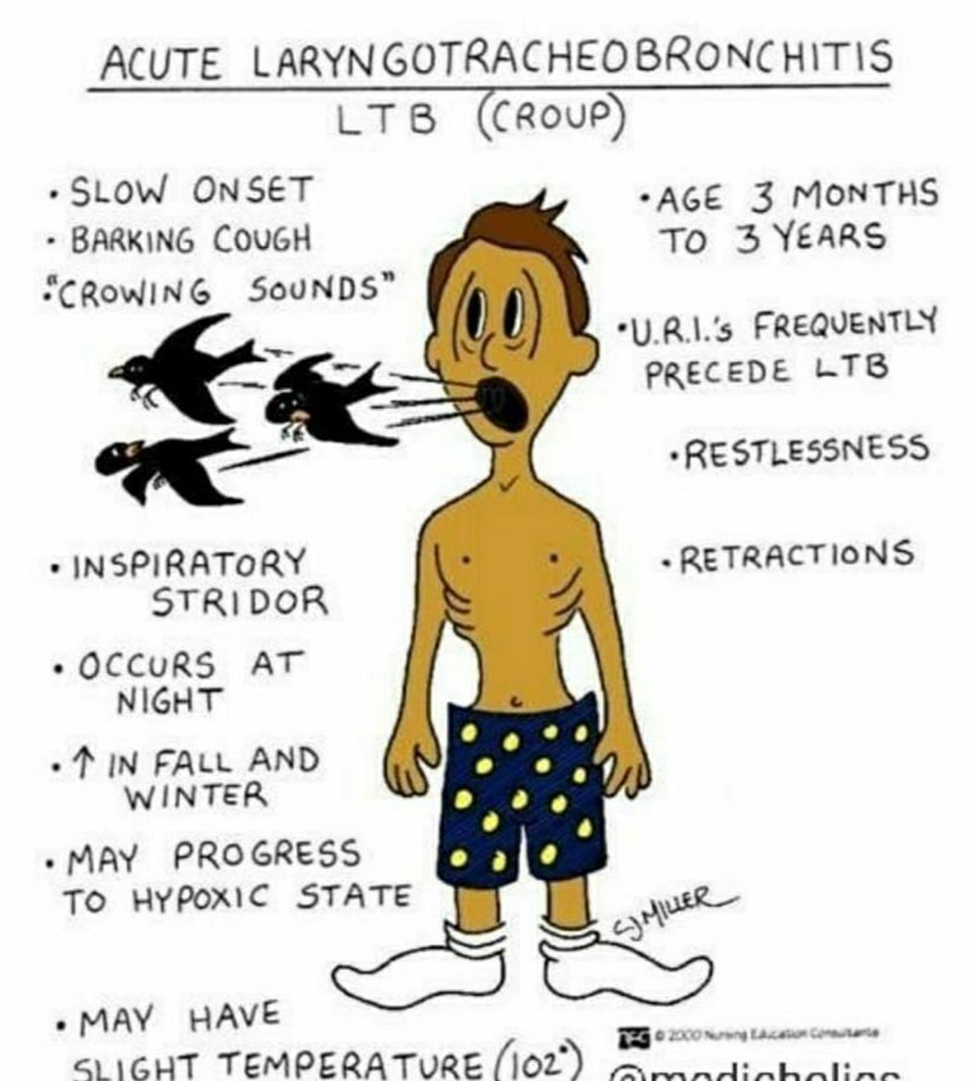The parent of a hospitalized 2-year-old child with viral laryngotracheobronchitis (croup) asks the nurse why the pediatrician did not prescribe antibiotics. Which response would the nurse make?
The child is too young to receive antibiotics
"Antibiotics are not indicated unless a bacterial infection is present.
The child may be allergic to antibiotics.
The child still has the maternal antibodies from birth and does not need antibiotics
The Correct Answer is B
A. The child is too young to receive antibiotics: This statement doesn't address the actual reason for not prescribing antibiotics for croup, which is primarily due to its viral nature.
B. "Antibiotics are not indicated unless a bacterial infection is present."
Explanation:
Viral laryngotracheobronchitis, commonly known as croup, is typically caused by a viral infection, most commonly by the parainfluenza virus. Antibiotics are not effective against viruses. Therefore, unless a bacterial infection is also present, prescribing antibiotics is not necessary or beneficial in treating croup.
C. The child may be allergic to antibiotics: While antibiotic allergies are a consideration, it doesn't explain why antibiotics are not prescribed for viral illnesses like croup.
D. The child still has the maternal antibodies from birth and does not need antibiotics: Maternal antibodies can offer some protection against infections, but the primary reason for not using antibiotics in viral infections like croup is because antibiotics are ineffective against viruses.

Nursing Test Bank
Naxlex Comprehensive Predictor Exams
Related Questions
Correct Answer is B
Explanation
A. Cranberry juice
Explanation: Acidic and citrus juices, including cranberry and orange juice, should be avoided in the immediate postoperative period as they can be irritating to the surgical site and may increase the risk of bleeding.
B. Crushed ice
Explanation:
After a tonsillectomy, it's important to provide cold and clear fluids to soothe the throat and prevent bleeding. Crushed ice is a suitable option as it helps keep the throat cool and provides hydration without irritating the surgical site. Cold liquids can help minimize swelling and provide comfort.
C. Vanilla milkshake
Explanation: While milkshakes may be appealing, dairy products can coat the throat and may not be recommended immediately after surgery. Additionally, it's crucial to avoid using straws, as sucking can increase the risk of bleeding.
D. Orange juice
Explanation: As mentioned earlier, citrus juices like orange juice can be irritating to the surgical site and are not recommended in the early postoperative period after a tonsillectomy. It's essential to choose clear and non-acidic fluids to support healing and prevent complications.
Correct Answer is ["260"]
Explanation
To calculate the total fluid intake, add the volumes of each item consumed:
Juice: ½ cup
1 cup = 240 mL
½ cup = 240 mL / 2 = 120 mL
Gelatin: 3 oz
1 oz ≈ 30 mL
3 oz = 3 * 30 mL = 90 mL
Ice pop: 1 oz
1 oz ≈ 30 mL
1 oz = 30 mL
Ginger ale: 20 mL
Now, add these values:
120 mL (juice) + 90 mL (gelatin) + 30 mL (ice pop) + 20 mL (ginger ale) = 260 mL
Therefore, the nurse should record 260 mL as the child's fluid intake.
Whether you are a student looking to ace your exams or a practicing nurse seeking to enhance your expertise , our nursing education contents will empower you with the confidence and competence to make a difference in the lives of patients and become a respected leader in the healthcare field.
Visit Naxlex, invest in your future and unlock endless possibilities with our unparalleled nursing education contents today
Report Wrong Answer on the Current Question
Do you disagree with the answer? If yes, what is your expected answer? Explain.
Kindly be descriptive with the issue you are facing.
